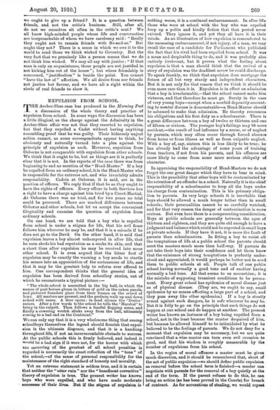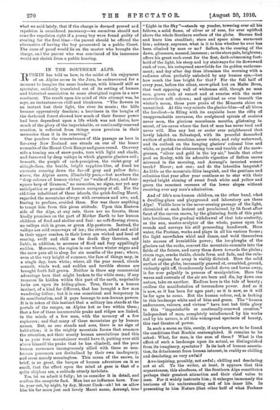EXPULSION FROM SCHOOL.
THE Archer-Shee case has produced in the Morning Post a discussion of the whole theory and practice of expulsion from schooL In some ways the discussion has been a little illogical, as the charge against the Admiralty in the Archer-Shee affair was not that they resorted to expulsion, but that they expelled a Cadet without having anything
resembling proof that he was guilty. Their hideously unjust action cannot, as some correspondents appear to think, be obviously and naturally turned into a plea against the principle of expulsion as such. Moreover, expulsion from Osborne is not comparable with expulsion from other schools.
We think that it ought to be, but as things are it is perfectly clear that it is not. In the reports of the case there was from beginning to end no mention of the " Head-Master." If a boy be expelled from an ordinary school, it is the Head-Master who is responsible for the extreme act, and who invariably admits responsibility. Cadets at Osborne, it is said, are in the position of officers. We reply that if that be so they ought to have the rights of officers. Every officer in both Services has a right to have a charge against him tried by a Court-Martial At Osborne there was no trial, and for two years no trial could be procured. There are marked differences between Osborne and other schools, but let us accept the convenient illogicality and examine the question of expulsion from ordinary schools.
On one hand, we are told that a boy who is expelled from school is under a stigma for life, that his evil fame follows him wherever he may be, and that it is a miracle if he does not go to the Devil. On the other hand, it is said that expulsion leaves a boy almost unhampered in after life, that he soon sheds his bad reputation as a snake its skin, and that a short time after expulsion he may be received into some other schooL It is even argued that the bitter fact of expulsion may be exactly the warning a boy needs to startle his senses into an appreciation of the seriousness of life, and that it may be the greatest help to reform ever offered to him. One correspondent thinks that the general idea of expulsion has been derived from schoolboy stories, out of which he reconstructs a typical picture :—
" The whole school is assembled in the big hall, in which the names of past heroes gleam in letters of gold on the oaken panels, and pictured founders glare from their frames on the crowd of boys. All masters are present, and the prefects walk up and down armed with canes. A door opens : in dead silence the 'Doctor' enters. After a few words to the school he tells the Marshal' to bring in the culprit. Then follows a fearful flogging scene, and finally a cowering wretch slinks away from the hall, ultimately coming to a bad end on the Continent:
We can only say that it is a very wholesome thing that among schoolboys themselves the legend should flourish that expul- sion is the ultimate disgrace, and that it is a handicap
throughout life, if not an insurmountable obstacle to success. At the public schools this is firmly 'believed, and indeed it would be a bad sign if it were not, for the horror with which tne Incurring of the greatest of all school penalties is
regarded is necessarily the exact reflection of the " tone " of the school,—of the sense of personal responsibility for the maintenance of the right standard of honesty and morality.
Yet an extreme statement is seldom trite, and it is certain that neither the "utter ruin " nor the " beneficent corrective theory of expulsion is true. The present writer has known boys who were expelled, and who have made moderate successes of their--lives. But if the stigma of expulsion is
nothing worse, it is a continual embarrassment. In after life those who were at school with the boy who was expelled keep up a polite and kindly fiction that that period never existed. They ignore it, and yet they all have it in their minds. As an illustration of how expulsion is remembered to the unceasing embarrassment, if not injury, of a man, we may recall the case of a candidate for Parliament who published the fact that his rival had been expelled from schooL It was a mean and despicable thing to do, and it was probably also entirely irrelevant, but it proves what the feeling about expulsion is that a man should think that the revival of a story of expulsion was the deadliest arrow he could discharge. To speak frankly, we think that expulsion does mortgage the future of all but very sturdy and independent characters. But it is not only for that reason that we think it should be even more rare than it is. Expulsion is in effect an admission that a boy is irreclaimable,—that the school cannot make him virtuous, and that therefore he must go. Surely in the case of very young boys—except when a morbid depravity amount- ing to mental disease is demonstrable—a Head-Master should be ashamed to make that admission. He thereby renounces his obligations and his first duty as a schoolmaster. There is a great difference between a boy of twelve or thirteen and one of fifteen or sixteen. The younger boy's failings may b% mere accident,—the result of bad influence by a nurse, or of neglect by parents, which may often occur through forced absence from home or from illness as well as from culpable neglect. With a boy of, say, sixteen this is less likely to be true; he has already had the advantage of some years of training from teachers, if not from his parents, and his offences are more likely to come from some more serious obliquity of character.
In appraising the responsibility of Head-Masters we do not forget the one great danger which they have to bear in mind. This is the possibility that other boys will be contaminated by the retention of an offender in a school. Naturally it is the chief responsibility of a schoolmaster to keep all the boys under his charge from contamination. This is his primary obliga- tion to parents. In very large schools it is inevitable that boys should be allowed a much longer tether than in small schools; their personalities cannot be so carefully watched, and for that very reason the danger of contamination is more serious. But even here there is a compensating consideration. Boys at public schools are generally between the ages of thirteen and eighteen, and they are quite old enough to have a judgment and balance which could not be expected in small boys at private schools. If they have it not, it is more the fault of parents than schoolmasters. In fitting a boy to resist all the temptations of life at a public school the parents should meet the masters much more than hall-way. If parents do not take their boys into their confidence and let them know that the existence of strong temptations is perfectly under- stood and appreciated, it would perhaps be better not to send them to public schools at all People talk of one public school having normally a good tone and of another having normally a bad tone. All that seems to us moonshine ; it is the mistake of supposing transient conditions to be perma- nent. Every great school has epidemics of moral disease just as of physical disease. (They are, we ought to say, small epidemics by no means affecting a large part of a school, and they pass away like other epidemics.) If a boy is stoutly armed against such dangers, he is safe wherever he may be. But it is folly to go on the principle that such things do not happen at one school and do happen at another. The present writer has known an instance of a boy being expelled from a school, not in the least because the master despaired of him, but because he allowed himself to be intimidated by what he believed to be the feelings of parents. We do not deny for a moment that expulsion may be necessary, but we are quite convinced that a wise master can turn even evil occasion to good, and that his wisdom is roughly measurable by the number of expulsions from his schooL In the region of moral offences a master must be given much discretion, and it should be remembered that, short of the act of public expulsion—we should define public expulsion as removal before the school term is finished—a master can negotiate with parents for the removal of a boy quietly at the end of the term. If the parent refuses to do this, he can bring an action (as has been proved in the Courts) for breach of contract. As for accusations of stealing, we would repeat
what we said lately, that if the charge is deemed proved and !xpalsion is considered necessary—we ourselves should not consider expulsion right if a young boy were found guilty of stealing for the first time—the parent should be offered the alternative of having the boy prosecuted in a public Court. The onus of proof would lie on the master who brought the charge, anl the parent who was convinced of his innocence would not shrink from a public hearing.







































 Previous page
Previous page